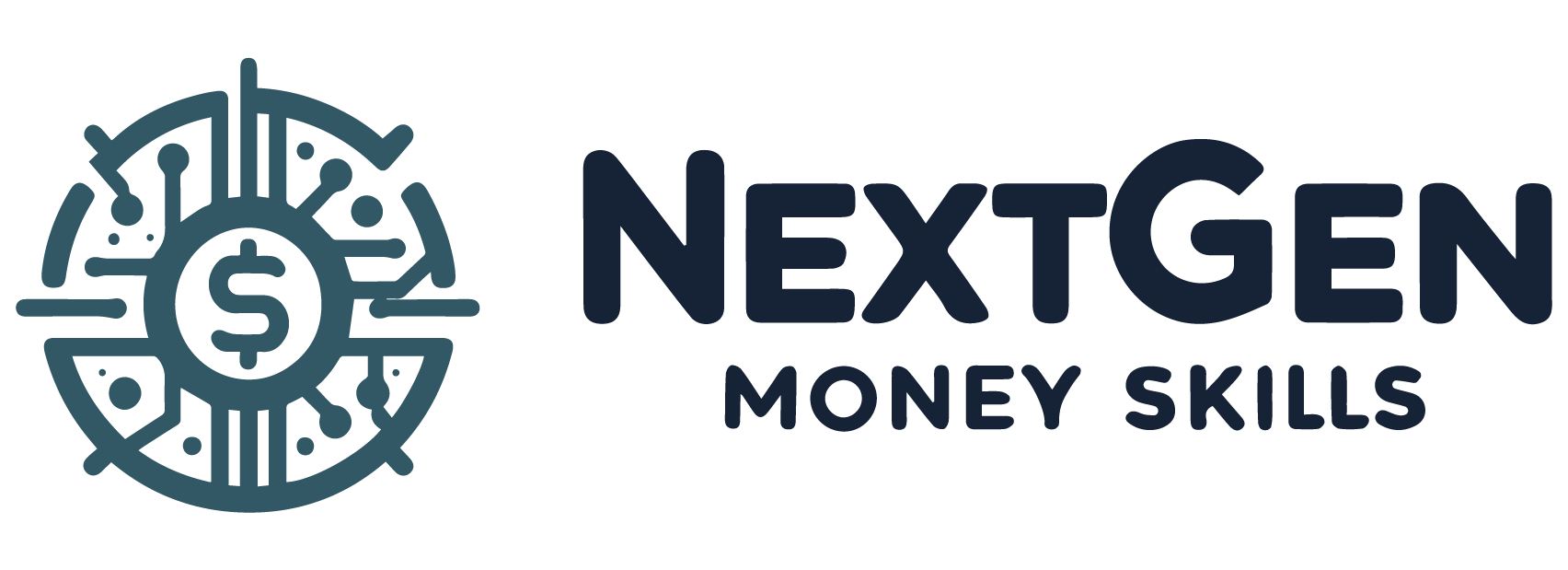Table of Contents
As we move towards a future where digital finance is becoming more prevalent, financial literacy has become an essential skill.
It is no longer enough to have a basic understanding of money management; it is also necessary to have a comprehensive knowledge of personal finance, which will empower the next generation to make informed decisions and confidently plan for their future.
Let’s cover the importance of financial literacy without the unnecessary jargon and how it can benefit you.
NextGen Money Skills is sharing the top steps to get started for long-term success, tools for navigating digital finance, building wealth in a changing economy, preparing students for financial independence, and overcoming common economic myths.

Why is Money Management Essential? Many people ask themselves this question, but the answer is simple.
Money management is essential because it helps you to achieve your financial goals.
Whether you want to save up for a house, pay off debt, or retire comfortably, having a solid understanding of money management is crucial. It allows you to create a budget, track your spending, and make informed financial decisions.
In the following sections, we will explore how you can benefit from financial literacy and the top steps to get started for long-term success.
Here’s more on what you will gain.
-
- Financial literacy is an essential skill to have in the digital age.
-
- Money management is crucial to achieving your financial goals.
-
- Understanding the basics and taking small steps can lead to long-term financial success.

Why Money Management Is Essential
As an individual, I understand the importance of money management in achieving financial stability and success. Managing finances is a crucial life skill that can help individuals achieve their financial goals and mitigate financial risks. This section will discuss why money management is essential and its benefits.
Understanding Financial Goals
Money management is essential because it helps individuals understand their financial goals and work towards achieving them. Individuals can prioritize their spending and save money for future needs by setting financial goals.
For instance, an individual may set a financial goal of saving for a down payment on a house. By managing their finances, they can allocate funds towards this goal and work towards achieving it.
Mitigating Financial Risks
Another reason why money management is essential is that it helps individuals mitigate financial risks. Financial risks can occur for various reasons, such as job loss, medical emergencies, or unexpected expenses.
By managing their finances, individuals can create an emergency fund to help them during financial emergencies. This can also help individuals avoid debt and maintain good credit scores.
Money management is essential for achieving financial stability and success. By understanding financial goals and mitigating financial risks, individuals can work towards achieving their financial goals and creating a secure financial future.

How You Can Benefit
As an individual, achieving financial stability is one of the most significant benefits of financial literacy.
Financial literacy can help you better understand your current financial situation, set realistic financial goals, and create a budget that works for you.
By doing so, you can manage your income and expenses effectively, avoid unnecessary debt, and start building wealth for the future.
Another significant benefit of financial literacy is the ability to gain financial freedom. With financial literacy, you can develop the skills and knowledge necessary to make informed decisions about investing, saving, and managing your money.
By doing so, you can build a solid financial foundation that will allow you to achieve your long-term financial goals, such as retirement, homeownership, or starting a business.
Achieving Financial Stability
Achieving financial stability is a crucial step towards financial independence. With economic stability, you can manage your expenses, pay off debt, and start building wealth for the future.
By developing and sticking to a budget, you can avoid overspending and ensure you have enough money to cover your expenses. Additionally, by building an emergency fund, you can prepare for unexpected expenses and avoid going into debt.
Gaining Financial Freedom
Gaining financial freedom means being able to make choices about how you live your life. Financial freedom allows you to pursue your passions, take risks, and achieve your dreams without worrying about money.
By developing the skills and knowledge necessary to manage your money effectively, you can create a solid financial foundation that will allow you to live the life you want.
Whether starting a business, traveling the world, or pursuing a new hobby, financial literacy can help you achieve your goals and live the life you want.

The Top Steps to Get Started for Long-Term Success
If you are interested in securing your financial future, there are several steps you can take to set yourself up for long-term success. These steps include setting realistic financial targets, creating a sustainable budget, and investing in financial education.
Setting Realistic Financial Targets
Setting realistic financial targets is one of the most critical steps in managing your finances. This means taking the time to identify your short-term and long-term financial goals and creating a plan to achieve them.
Some examples of short-term goals include paying off credit card debt or saving for a down payment on a house, while long-term goals include saving for retirement or building a college fund for your children.
Creating a Sustainable Budget
Another critical step in managing your finances is creating a sustainable budget. This means tracking your income and expenses and developing a plan to ensure you live within your means.
When creating a budget, it is essential to be realistic about your expenses and to prioritize your spending based on your financial goals.
This might mean cutting back on discretionary spending to save money or investing in high-quality, long-term assets like real estate or stocks.
Investing in Financial Education
Finally, investing in financial education is a critical step to securing your financial future. This might mean taking courses or attending seminars on personal finance, reading books on investing and money management, or seeking the advice of a financial advisor.
By learning about the ins and outs of financial management, you can make more informed decisions about your money and ensure that you are on the path to long-term success.
By setting realistic financial targets, creating a sustainable budget, and investing in financial education, you can take control of your finances and secure your financial future.

Tools for Navigating Digital Finance
Managing our finances online has become increasingly important as we move towards a more digital world.
Fortunately, there are many tools available that can help us navigate the world of digital finance with ease. Here are some of the most valuable tools for managing your finances online:
Personal Finance Management Software
Personal finance management software is a great way to keep track of your finances. These tools allow you to track your income and expenses, create budgets, and set financial goals.
Some popular personal finance management software includes Mint, Quicken, and YNAB.
Online Budgeting Tools
Online budgeting tools are another great way to manage your finances online. These tools allow you to create a budget and track your spending in real time.
They also provide helpful insights into your spending habits and can help you identify areas for improvement. Some popular online budgeting tools include PocketGuard, and EveryDollar.
Investment Tracking Apps
If you’re interested in investing, many apps can also help you track your investments.
These apps allow you to monitor your portfolio, track your gains and losses, and stay up-to-date on market trends. Some popular investment tracking apps include Robinhood, Acorns, and Stash.
Overall, many tools are available to help you navigate the world of digital finance. Whether you’re looking to manage your finances, create a budget, or track your investments, there’s sure to be a tool that can help.
So why not take advantage of these tools and start taking control of your finances today?

Building Wealth in a Changing Economy
As the economy evolves, we must adapt our wealth-building strategies accordingly. Here are two key ways to build wealth in a changing economy:
Diversifying Income Streams
One of the best ways to build wealth in a changing economy is by diversifying your income streams. In today’s gig economy, there are more opportunities than ever to earn money outside of a traditional 9-to-5 job.
Consider starting a side hustle, freelancing, or investing in rental properties. By diversifying your income streams, you can protect yourself from economic downturns and increase your earning potential.
Adapting to Economic Trends
Another way to build wealth in a changing economy is to adapt to economic trends. For example, new industries emerge as technology advances, and old sectors decline.
It’s essential to stay up-to-date with these trends and identify growth opportunities. Investing in renewable energy, cryptocurrency, or AI may be a smart move in today’s economy.
It is important to stay informed, be adaptable, and take calculated risks to build wealth in a changing economy. By diversifying your income streams and adapting to economic trends, you can set yourself up for long-term financial success.

Preparing Students for Financial Independence
As the world becomes increasingly digital, teaching young people how to manage their finances is more important than ever.
Incorporating financial education into the curriculum is one way to prepare students for economic independence.
Incorporating Financial Education in Curriculum
Financial education is a critical component of a well-rounded education. By incorporating financial education into the curriculum, students can learn the basics of money management, including budgeting, saving, and investing.
One way to incorporate financial education is to offer courses specifically focused on personal finance.
These courses can cover credit scores, taxes, and insurance. Additionally, financial education can be integrated into math, economics, and business classes.
Promoting Practical Financial Experiences
In addition to incorporating financial education into the curriculum, promoting practical financial experiences can help prepare students for economic independence. For example, schools can offer opportunities for students to participate in financial simulations or invest in a virtual stock market.
Another way to promote practical financial experiences is to encourage students to save early.
Schools can partner with banks or credit unions to offer students savings accounts and teach them the importance of saving for both short-term and long-term goals.
By incorporating financial education into the curriculum and promoting practical financial experiences, we can prepare the next generation for economic independence.

Overcoming Common Financial Myths
As someone passionate about financial literacy, I have encountered many things I need to learn about money management. In this section, I will debunk some of the most common financial myths and provide the necessary tools to overcome them.
Debunking Savings Misconceptions
One of the most common financial myths is that you need a lot of money to start saving. This is not true. You can start saving with as little as $5 a week. The key is to make saving a habit. Set up automatic transfers from your checking account to your savings account, and you’ll be surprised at how quickly your savings will grow.
Another misconception is that you should only save for emergencies. While having an emergency fund is essential, saving for other things, such as a down payment on a house, a vacation, or retirement, is also necessary. Make a list of your financial goals, create a savings plan, and open a high-yield savings account to earn more.
Clarifying Investment Fallacies
Investing can be intimidating, but it doesn’t have to be. One myth is that you need to be an expert to invest. This is not true. Many resources are available to help you learn about investing, such as books, online courses, and financial advisors.
Start by investing in low-cost index funds, which are a great way to start investing.
Another fallacy is that you need a lot of money to invest. This is also not true. You can start investing with as little as $50 a month.
The key is to start early and be consistent. Over time, your investments will grow, and you’ll be on your way to building wealth.
Conclusion: How To Get Started
Now that you know the truth about these common financial myths, it’s time to take action. Start by setting up a savings plan, paying off debt, and investing in low-cost index funds.
Remember, the key is to start small and be consistent. Over time, you’ll be amazed at how much progress you can make towards your financial goals.

Frequently Asked Questions
Why is financial literacy crucial for personal and professional growth?
Financial literacy has become an essential life skill as the world becomes increasingly complex and interconnected.
Being financially literate means having the knowledge and skills to manage your money effectively and make informed decisions about your finances.
It can help you achieve your financial goals, whether saving for a down payment on a house, paying off debt, or investing for retirement.
Moreover, financial literacy can help you navigate the economy’s ups and downs and make informed decisions about your career and business.
What are the key benefits of becoming financially literate?
Becoming financially literate can bring many benefits, including better financial health, increased economic security, and greater financial independence.
It can help you avoid costly mistakes, such as overspending, taking on too much debt, or investing in high-risk schemes. It can also help you build wealth over time and achieve financial freedom, which means having enough money to live the life you want without worrying about money.
What steps should one take to achieve long-term financial success?
Achieving long-term financial success requires combining knowledge, skills, and discipline.
Some key steps include setting financial goals, creating a budget, tracking your expenses, paying off debt, building an emergency fund, saving for retirement, and investing for the future.
It’s also essential to stay informed about financial trends and developments and to seek advice from trusted sources.
Which digital tools are essential for modern financial management?
In today’s digital age, many tools and resources are available to help you manage your finances more efficiently and effectively. Some essential tools include budgeting apps, investment platforms, online banking, and financial education resources.
These tools can help you track your spending, automate your savings, and stay informed about the latest financial trends and developments.
How can building wealth adapt to the dynamics of today’s economy?
Building wealth in today’s economy requires a different approach than in the past. With the rise of technology and globalization, traditional career paths and investment strategies may be less effective.
Instead, it’s essential to be adaptable, flexible, and innovative.
This may involve developing new skills, exploring new career paths, or investing in emerging markets and technologies.
What strategies can help prepare students for financial independence?
Preparing students for financial independence requires a comprehensive approach that includes formal education and practical experience.
Some key strategies include incorporating financial literacy into school curriculums, providing students with opportunities to practice financial decision-making, and connecting students with mentors and role models who have achieved economic success.
It’s also essential to encourage students to develop good financial habits early on, such as saving, budgeting, and investing early on.
Related posts:
No related posts.
